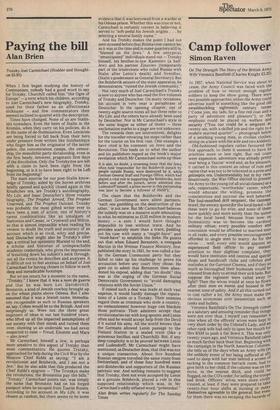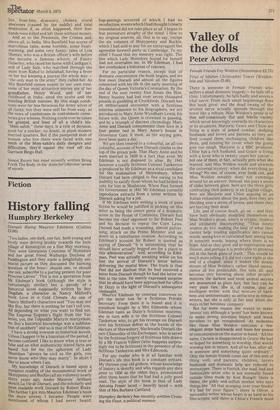Camp follower •
Simon Raven
On The Strength The Story of the British Army Wife Veronica Bamfield (Charles Knight £3.25) In 1957, when National Service was about to cease, the Army Council was faced with the problem of how to recruit enough regular soldiers to keep the show going. There were two possible approaches: either the Army could advertise itself in something like the good old
swashbuckling eighteenth century terms (-Come join, my lads, for a fine red coat and a
party of adventure and pleasure"); or the emphasis could be placed on welfare and security ("You too could be a sergeant at twenty-six, with a skilled job and the right to a
modern married quarter" — photograph below of a smirking young man, in civilian clothes,
sitting on a lawn with his wife and two kiddies). Old-fashioned regulars rather favoured the first approach; to them it seemed to have its priorities more or less right. But red coats were expensive, adventure was already pretty'
near being a 'fascist' word and, as for pleasure, it carried in this context an odour of rum and
rapine that was not to be tolerated in a prim and antiseptic era. Understandably but in my view disastrously, the War Office elected to present the Army to the young (of all social classes) as a safe, respectable, "worthwhile" career, which would educate the willing, promote the conscientious and succour the well behaved.
Tlie foul-mouthed drill sergeant, the canteen brawl, the sweaty queue for the local bawd — all these were to go for ever, and none of then more quickly and more surely than the queue for the local bawd, because from now on Domesticity was to become the cardinal military virtue; every possible comfort and concession would be afforded to married men
in all ranks, and every possible encouragement
afforded to single men to marry. As for the wives ... well, every unit would appoint an experienced field officer to pay instant attention to their slightest complaint, they would have institutes and centres and special shops and handicraft clubs and creches and matinees at the Garrison Cinema, and if they so much as hiccoughed their husbands would be released from duty to attend their sick beds. But suppose the regiment were called away to fight? Then the wives would at once be flown after their men en masse and housed in the nearest zone of safety. And if all this turned out to cost rather a lot, the Army must make the obvious economies over inessentials such as tanks and bullets.
Veronica Bamfield's On The Strength comes as a salutary and amusing reminder that things were not ever thus. I myself can remember a
time when all the officers' wives were kept in very short order by the Colonel's Lady, and an
other rank wife had only to open her mouth for Mrs RSM to push a fist down it. This was onlY twenty years ago, and Veronica Bamfield takes us much farther back than that. Beginning with
the campaign in the North American Colonies, she tells us of the days when an Army wife (in
the unlikely event of her being suffered at all) used to sleep with her man behind a screen of sacking in the common barrack room, had to give birth to her child, if the column was on the move, in the nearest ditch, and could be flogged, on the CO's order, for selling the trooPs
bad drink. Officers' wives were more civillY treated, at least if they were prepared to take twenty-four hour shifts at nursing or make themselves agreeable to the general; but even for them there was no escaping the hazards of
lice, frost-bite, dysentery, cholera, crural abscesses (caused by the saddle) and total destitution if, as often happened, their husbands were killed and left them without money.
And so to the Peninsula, the Crimea and, above all, to India. Mrs Bamfield has scores of marvellous tales, some horrible, some heartwarming, and some very funny: tales of Lola Montez, who was a British officer's wife before she became a famous whore; of Fanny Duberley, who raced her horse with Cardigan's; and of Lady Sale, who marched through the snow from Kabul to Jellalabad, having a fever on her but keeping a journal the whole way — -the only man in the army".they called her. As Mrs Barnfield comes nearer to our own time, some of her most attractive stories are of her grandfather, Henry Wood, and of her childhood in India, amid the ayahs and the bristling British nannies. By this stage conditions were far less ferocious for Army wives of all ranks; but they were still far from easy, as the rows of tombstones in cantohment cemeteries give witness. Nothing could ever be taken for granted, and least of all a child's life. "Men-sahib," these days, is a title of derision, good for a snicker, no doubt, in plush modern married quarters. But if the pampered mob of women who live there were faced with one tenth of the Mem-sahib's daily dangers and difficulties, they'd squeal the roof off the Garrison Bingo Hall.
Simon Raven has most recently written Bring Forth The Body, in his 'Alms for Oblivion' series of novels











































 Previous page
Previous page